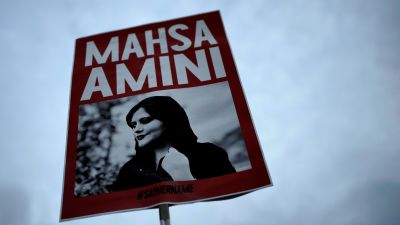World governments 'need to do more to hold Iran to account' a year on from Mahsa Amini’s death

By Roohi Hasan, ITV News Senior Producer
A year ago today, 21-year-old Mahsa Amini died in police custody, detained for not observing the hijab fully. Her family believe her death was a result of being beaten in custody.
The protests which began in Iran as a result of the country’s government treatment of Amini were unprecedented in scale and soon spread across the country and then the world.
A brutal crackdown by the regime followed, described as a "litany of crimes against international law" by human rights organisation, Amnesty International in their new report to mark the first anniversary.
They describe the past twelve months as a year of "unspeakable cruelty."
ITV News has spent the year investigating and revealing many of these crimes. They include:
1) The killings of hundreds of protestors and bystanders, including an estimated 60 children in the first 60 days.
Amnesty told us the youngest was aged just two-years-old.
2) The injuries of thousands of people, through what Amnesty describe as the "unlawful use of live ammunition, teargas."
3) The arrest of tens of thousands of protestors and bystanders, as well as dozens of journalists and lawyers.
ITV investigations discovered many were being held in detention subject to torture and, according to Amnesty, thousands were held in inhumane conditions.
This is why top human rights lawyer, Gissou Nia, has told ITV News that the United Nations and world governments need to do more to hold Iran’s government to account.
Gissou, the director of Strategic Litigation at the Atlantic Council in America, works on accountability for atrocity crimes and human rights violations. Of Iranian heritage herself, she has spent the past year lobbying the United Nations and its member governments to take action.
Gissou tells us a huge success of the past year has been the establishment of the UN fact-finding mission which she describes as "really incredible achievement" as for years "there had been no serious mechanisms or procedures set up to monitor the human rights situation in Iran."
The mission is due to produce a comprehensive report on violations, which will be presented in Geneva to UN member states of the Human Rights Council next spring.
The key issue she says is the outcome.
She said: "What we're hoping will result from that is that war crimes units around the world who deal with looking at crimes against humanity allegations, torture allegations that they might have the information that they need to more robustly go after perpetrators when they come into their countries."
Human rights lawyer Gissou Nia told ITV News that the United Nations and world governments need to do more to hold Iran’s government to account
She is defiant that there is also a lot more that states can do when it comes to accountability.
Gissou said: "The UN fact-finding mission mandate only goes to March 2024. Every country who's a member of the UN Human Rights Council should absolutely be pushing for the extension of that mandate.
"18 months is not nearly enough to document the situation. And there have been ongoing violations since then. We needed an extension of that UN mandate, and that's how countries around the world can lend their support."
A year on from Mahsa’s death the UN Fact Finding mission said on Friday the "heightened repression of women and girls and reprisals against protesters and victims’ families is deeply troubling."
Gissou revealed to us a key positive milestone achieved this month ahead of this anniversary.
She said: "For the first time ever the UN special rapporteur on human rights in Iran and other UN experts came together to issue a joint statement saying that the compulsory hijab laws in Iran can amount to gender apartheid."
"This is huge because these kinds of statements from UN experts build the groundwork for changes to be made to international law and for gender apartheid to be codified."
She said Iran's people were also asking for accountability: "They're asking for when Iranian officials travel outside of Iran, that they be brought to court under universal jurisdiction laws.
"They're asking for the international community to do all they can to ensure that the Iranian people are centered and empowered, and that the Iranian regime is disempowered."
Noting the first anniversary of Mahsa Amini's death, Gissou said: "I'm feeling a sense of dismay at the fact that the demands that women were making right after she was killed and that the population was making about the fact that they do not want this regime and power has got only a part of the way forward.
"Whilst a lot of countries around the world, a lot of governments are just assuming that it's a status quo and that we're back to business as usual, and they have stopped prioritising the demands of these protestors for change."
The Iranian embassy has been approached for comment.
Want a quick and expert briefing on the biggest news stories? Listen to our latest podcasts to find out What You Need To Know...